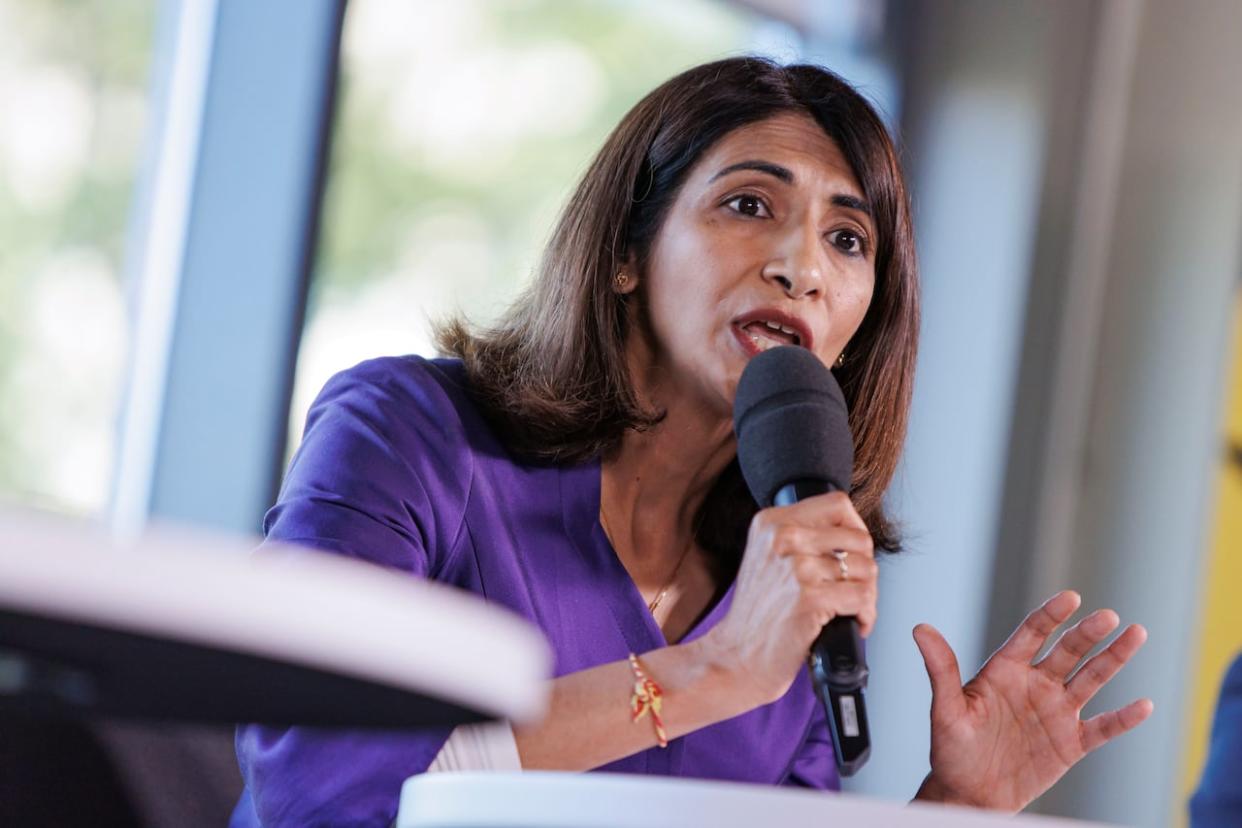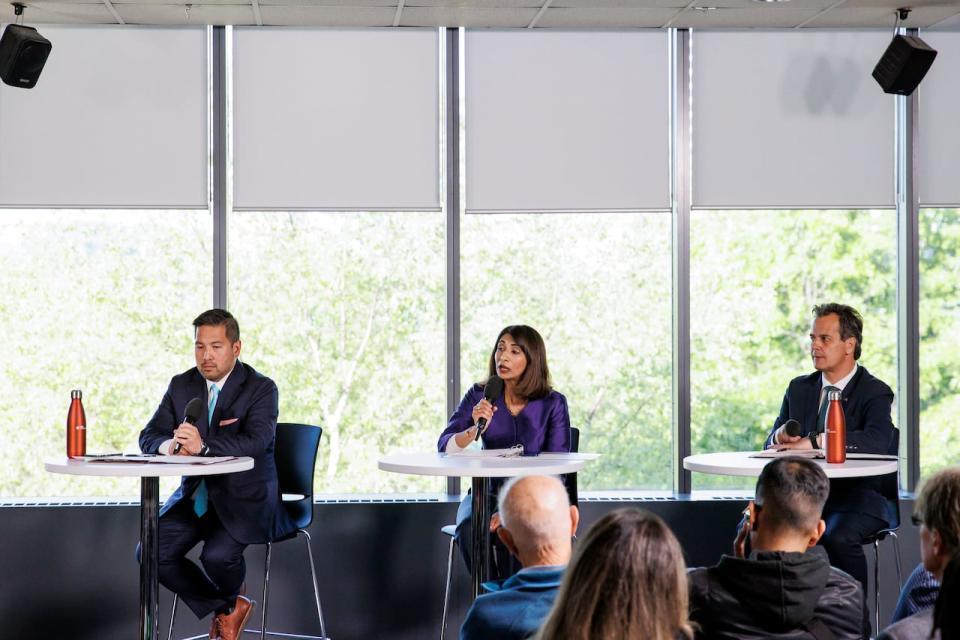Mississauga byelection ad targets Parrish on land transfer tax

With just over a week left until Mississauga's mayoral byelection, talk of taxes is heating up — and so are attacks between two high-profile candidates.
Dipika Damerla is targeting her former Mississauga city council colleague Carolyn Parrish on social media and her website, saying Parrish has "mused at city council about doubling land transfer taxes."
For her part, Parrish says her opponent is oversimplifying a complex issue.
The evidence Damerla includes is a roughly 10-second clip of Parrish speaking during a January 2022 meeting of council's general committee. In it, Parrish says, "Well, I'm interested not just in capital gains tax, but I'm interested in all forms of taxation, that are in our power, to do with housing transfers from one owner to another."
The ad then cuts to Damerla promising to keep taxes low and reject any attempt to introduce a municipal land transfer tax in Mississauga similar to the one in place in Toronto. Toronto's local tax is levied in addition to the provincial land transfer tax, and brings in nearly $1 billion for the city each year.
The full recording of the commitee meeting offers some context for Parrish's remarks.
The committee was debating the city's pre-budget submissions to the provincial and federal governments, which included recommendations for generating municipal revenue and discouraging real-estate speculation.
Parrish was responding to former mayor Bonnie Crombie, who expressed opposition to the possibility of an enhanced capital gains tax on some residential properties in the city.
Parrish did not specifically refer to a municipal land transfer tax after making the comments featured in the clip circulated by Damerla's campaign.
Instead, Parrish went on to say that she'd like city staff to explore the revenue implications of an annual surcharge on homes valued at $2 million or more, starting at 0.2 per cent and going up to one per cent.
"It's a progressive form of tax, just like income tax is. People who have a house that's worth $2 million can afford to pay an extra 400 bucks in taxes a year," she said.
"I would like to look at all of these [forms of taxes]. We've talked about it before. We talk about building a soccer stadium, we talk about all kinds of things we'd like to do for our city, and we can't do it because we don't have the money," Parrish continued.
Can't say 'yes or no' on supporting land transfer tax: Parrish
At Thursday's mayoral byelection debate, CBC Toronto asked Damerla if the short clip used in her attack ad backs up the claim Parrish would try to bring a municipal land transfer tax to Mississauga.
"I would invite people to watch the entire video and come to their own conclusions," Damerla said.
She added her campaign has "deliberately ensured that people have access to the entire video," but it's not clear what she meant.
Parrish controversially stopped attending debates earlier this month. But in an email, she declined to say definitively whether she supports adding a local land transfer tax to the existing provincial levy, something that is not in her platform and would need to be approved by Premier Doug Ford's government.
Instead, she told CBC Toronto: "Can't answer yes or no. If it's tailored correctly it may help first-time home buyers. That's why I find yes or no answers so simplistic."
Earlier in the email exchange, Parrish pointed out that longtime former mayor Hazel McCallion proposed such a tax in 2012 as a way to boost revenues so property taxes could be cut. The idea met with fierce resistance from the real estate industry and was eventually abandoned.

Mississauga mayoral candidates Dipika Damerla (centre), Stephen Dasko (right), and Alvin Tedjo (left), take part in the last debate of the campaign, hosted by CBC Toronto on May 30, 2024. (Evan Mitsui/CBC)
Parrish also provided some details on what a local land transfer tax could look like in Mississauga.
"It could slow down investors buying and flipping starter homes, forcing prices up. Families entering the market would have to be exempt as well as homes selling for under the average price of a unit in the City. It should also be exempt on a prime residence purchase," she said.
"It's very complex. Those suggesting I support a local [land transfer tax] are simplistic thinkers and basically incorrect," she continued.
Campaign entering final stretch
Damerla's negative ad aimed at Parrish comes as the campaign enters its final stretch before election day on June 10.
A May 28 poll from Liaison Strategies suggests Parrish is the frontrunner, with 29 per cent of respondents saying they would cast a ballot for her. Damerla was second, with 24 per cent support among respondents. Mississauga city councillors Alvin Tedjo and Stephen Dasko were third and fourth, respectively.
The interactive voice response survey was taken from May 24 to 25 among 933 Mississauga residents eligible to vote in the byelection and weighted according to census data.
Zac Spicer, an associate professor in the school of public policy and administration at York University, said the approach of the ad is likely an attempt by Damerla's camp to gain ground quickly as the campaign nears its end.
"We are in the sort of final leg of the journey here. So if you were going to try to make some gains, going negative is probably the way you think you're going to do it," Spicer told CBC Toronto.
He said focusing on the issue of housing could resonate with undecided voters.
"So far it seems that housing is the issue in this particular race," he said. "If you're going to attack one of your opponents, I'd say you want to focus on the cost of housing. Affordability is big, so it ties into that as well."


